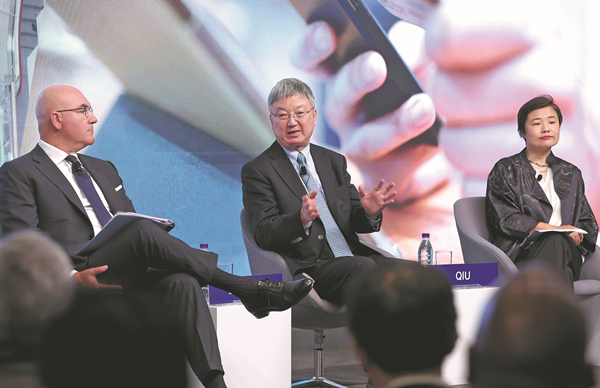Consumption's big role in focus

Zhu Min (center), former deputy managing director of the International Monetary Fund, at the Reinvigorating Consumption forum on Tuesday. ZOU HONG/CHINA DAILY
Despite the pressure of lackluster domestic demand, China still has the capability and conditions to further tap consumption potential to sustain high-quality growth, experts and entrepreneurs said at the 15th Annual Meeting of the New Champions, also known as Summer Davos Forum, in Dalian, Liaoning province on Tuesday.
"China is moving to a higher-income country," Zhu Min, former deputy managing director of the International Monetary Fund, told a forum on the theme of "Reinvigorating Consumption" on Tuesday. "The real big chance is on the consumption bundle. The consumption basket changed dramatically."
He noted a shift in consumption from people's needs in basic consumer goods like clothes, transportation and housing to advanced consumption in services including education, healthcare, entertainment and tourism. "So I think in the future we need to upgrade on the supply side to provide a service consumption bundle to the consumer."
Zhu also noted the rising Chinese household savings indicate the still-weak consumption desire and a supply-demand mismatch. He highlighted the importance of tackling issues surrounding consumer confidence, future uncertainties and social security.
Data from the National Bureau of Statistics showed that retail sales, a key measure of consumer spending, rose 3.7 percent year-on-year in May versus 2.3 percent in April.
Zhu said he is confident that China has huge potential to further boost domestic consumption given the potential growth in services consumption and the future development of the consumption sector. "We need to focus on policy to stimulate service consumption and service development, such as reforms in the services sector, and expand opening-up in the services sector."
Hannah Qiu, senior vice-president and China CEO of Paypal, took stock of the new trends in the China market, saying that while consumers are looking for better pricing for basic goods, the younger generation is more focused on experiences and unique designs and willing to pay extra money for that.
"These consumption downgrades and upgrades may happen in one person. So you can see very different trends," Qiu said. "They're willing to pay for big-ticket products, but they're also looking for smart bargains at the same time."
Paypal's Chinese customers are mostly small and medium-sized enterprises selling in the global market, Qiu said. Such companies have already transformed their business models, trying to build up more value-added services, even for physical goods. "They are not stopping after purchasing the products. They're looking for continuous upgrades or services, even after the purchase transactions are done."
"We see big opportunities to boost consumption and we also see these opportunities for Chinese manufacturers to upgrade their products, with a focus on design, (after-sales) services and better protection for the customer," Qiu said.
Pierluigi Antonelli, CEO of German healthcare conglomerate Fresenius Kabi, said: "For us, China is one of the top three markets on a global basis, which is the reason why we act very local in China. We have three R&D centers. We have heavy production with four sites and also a commercial unit."
He said China is actively developing the silver economy. More growth opportunities, he said, will arise in terms of services and goods for the elderly in China as the country has the world's largest senior population.





 play
play